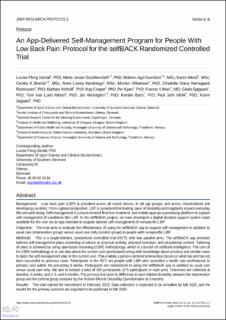An App-Delivered Self-Management Program for People With Low Back Pain: Protocol for the selfBACK Randomized Controlled Trial
Sandal, Louise Fleng; Stochkendahl, Mette J; Svendsen, Malene Jagd; Wood, Karen; Øverås, Cecilie Krage; Nordstoga, Anne Lovise; Villumsen, Morten; Rasmussen, Charlotte Diana Nørregaard; Nicholl, Barbara I; Cooper, Kay; Kjaer, Per; Mair, Frances; Sjøgaard, Gisela; Nilsen, Tom Ivar Lund; Hartvigsen, Jan; Bach, Kerstin; Mork, Paul Jarle; Søgaard, Karen
Peer reviewed, Journal article
Published version

Åpne
Permanent lenke
https://hdl.handle.net/11250/2993730Utgivelsesdato
2019Metadata
Vis full innførselSamlinger
Sammendrag
Background:
Low back pain (LBP) is prevalent across all social classes, in all age groups, and across industrialized and developing countries. From a global perspective, LBP is considered the leading cause of disability and negatively impacts everyday life and well-being. Self-management is a recommended first-line treatment, and mobile apps are a promising platform to support self-management of conditions like LBP. In the selfBACK project, we have developed a digital decision support system made available for the user via an app intended to support tailored self-management of nonspecific LBP.
Objective:
The trial aims to evaluate the effectiveness of using the selfBACK app to support self-management in addition to usual care (intervention group) versus usual care only (control group) in people with nonspecific LBP.
Methods:
This is a single-blinded, randomized controlled trial (RCT) with two parallel arms. The selfBACK app provides tailored self-management plans consisting of advice on physical activity, physical exercises, and educational content. Tailoring of plans is achieved by using case-based reasoning (CBR) methodology, which is a branch of artificial intelligence. The core of the CBR methodology is to use data about the current case (participant) along with knowledge about previous and similar cases to tailor the self-management plan to the current case. This enables a person-centered intervention based on what has and has not been successful in previous cases. Participants in the RCT are people with LBP who consulted a health care professional in primary care within the preceding 8 weeks. Participants are randomized to using the selfBACK app in addition to usual care versus usual care only. We aim to include a total of 350 participants (175 participants in each arm). Outcomes are collected at baseline, 6 weeks, and 3, 6, and 9 months. The primary end point is difference in pain-related disability between the intervention group and the control group assessed by the Roland-Morris Disability Questionnaire at 3 months.
Results:
The trial opened for recruitment in February 2019. Data collection is expected to be complete by fall 2020, and the results for the primary outcome are expected to be published in fall 2020.
Conclusions:
This RCT will provide insights regarding the benefits of supporting tailored self-management of LBP through an app available at times convenient for the user. If successful, the intervention has the potential to become a model for the provision of tailored self-management support to people with nonspecific LBP and inform future interventions for other painful musculoskeletal conditions.
